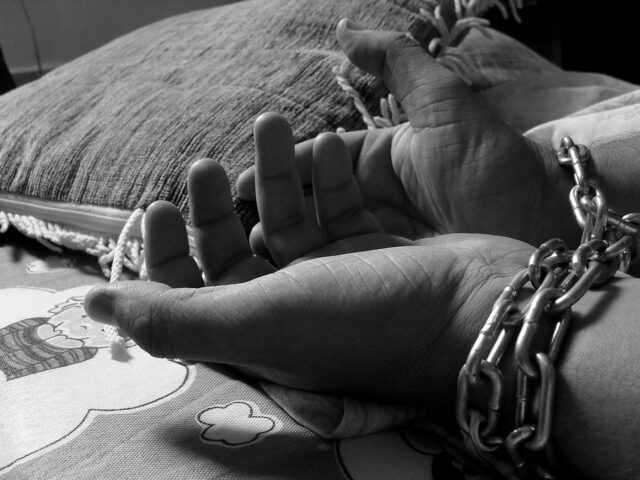INTRODUCTION
Human trafficking is the type of modern-day slavery in which a person is sold or used forcefully for the point of labor or commercial sex act. This is all that happens to intend to earn money. Human trafficking is not just a heinous crime against society but is a sin for our society. It has no boundaries for anyone irrespective of sex, gender, caste, or race anyone can be a victim of human trafficking but the most vulnerable ones are women and children. Children being innocent and getting easily influenced by others became victims of sexual acts. Due to the overpopulation and lack of job opportunities, many women from poor families are forced to get indulged in this profession and in some cases, a close family member becomes the hoes and sells them for such work.
According to the survey of the United Nations Office for drugs and crime [UNODC], it was found that the victim of human trafficking were 51% women, 28% children, and 21% men. Majorly women were abused by sexual violence which is 51%, 28% for children, and 21% for men. There are 43% of victims who are domestically within the national borders have been trafficked, it is shocking to know that the traffickers are not only men but it also constitutes 37% of women and 63% of men.
Some articles in the constitution are related to human trafficking.
ARTICLE 23
Article 23 talks about the prohibition of human trafficking and forced labor. Forced labor means less than minimum wage is paid. Any trafficking in human beings and beggars is prohibited and punishable in accordance with the law. In this article, the state is not prevented from commanding compulsory services for public purposes. The state shall not discriminate based on sex, color, caste, race, or any other. This article not only protects the state but also private citizens.1
ARTICLE 21
Article 21 is a fundamental right under part 3 of the Indian constitution, which talks about the right to life and personal liberties. It is one of the most essential articles in the Indian constitution. The supreme court of India mentioned it as the ‘heart of fundamental rights ‘. It states that no person shall be deprived of life and liberty except as per the procedure established by law. Everyone is entitled to live with full dignity by birth.2
ARTICLE 51 A [E]
Article 51 A [e] is a fundamental duty to promote Peace, Harmony, and a sense of unity amongst the people of India cut across linguistic, religious, and regional basis, to repudiate practices that can be insulting to women.3
LAWS RELATED TO HUMAN TRAFFICKING
INDIAN PENAL CODE, 1860
- SECTION 366A
If any person induces any minor to go with him to any other place with the intention of seducing her or doing illicit activities he or she will be punishable with the imprisonment of 10 years or fine or both.4
- SECTION 366B
Whoever imports a girl from any other country under the age twenty one with the intent to force or seduce her for intercourse with another person then, a person can be liable for imprisonment of 10 years and a fine can also be imposed.5
- SECTION 374
This section deals with unlawfully forcing someone to labor against their will or desire. Such a person can be punished with imprisonment which can be extended to 1 year or fine or both.6
- SECTION 370
Whomever imports, exports, removes, buys, sells, or disposes of any person as a slave, or accepts, receives, or detains any person as a slave against his will, will be punished by imprisonment of either kind for a duration up to seven years, as well as a fine.7
THE IMMORAL TRAFFIC [PREVENTION] ACT, 1956
This act was passed by the parliament of India in 1956 and the main objective or purpose of this act is to prevent commercial sex or immoral traffic among women and girls. This act covers the entire country. This act defines a brothel as a “house or any portion of the house, room or any portion of any room, conveyance or portion of any conveyance, and place or portion of any place.” And prostitution is “the sexual exploitation or abuse of persons for commercial purposes or consideration in money or any other kind.” In this act, if any person runs a brothel or aid in such activities then he or she will be punishable with imprisonment for one year which can be extended to 3 years, and a fine of rupees 2000 can also be imposed. If any tenant knowing allows them to use the property for such use then he or she can be imprisoned for two years and a fine of rupees 2000 can also be imposed on them.
THE ANTI TRAFFICKING BILL, 2021
This bill focuses on the prevention of human trafficking, providing rehabilitation cure compensation to the victims, and providing stringent punishments for the traffickers. The early bill of 2018 was never introduced in the Lok Sabha. The 2021 bill is different from the previous bill as it also extends outside India. In this bill, the national investigation agency will also be set up. This will also include transgenders along with women and children in the definition of a victim. The central government will also set up a national anti-trafficking committee and many committees will be set up at state and district levels for the better implementation of rules and regulations.
CASE LAWS
PEOPLE’S UNION FOR DEMOCRATIC RIGHTS VS UNION OF INDIA
In this case, the people’s union of democratic rights filed a writ petition before the supreme court of India under Article 32 of the Indian constitution for the violation of fundamental rights and certain rights for laborers.8 People union of democratic rights is an organization set up to make a report on the exploitation of living conditions of laborers under contractors. In this case, the court defined forced labor under article 23, forced labor basically means employing labor and providing them wages which is less than the minimum wage rate. In this case, the court held that forced labor is a violation of the fundamental right of article 23 and the person can file a writ petition under Article 32 for the violation of their fundamental rights.9
LAXMI KANT PANDEY VS UNION OF INDIA
In this case, a writ petition was filed by Laxmi Kant Pandey regarding the malpractices in adopting children from foreign parents. This case brings to highlight the need for having rules and regulations regarding intercountry adoptions. The children go to another country and get neglected by their adopted parents, making a toxic and unhealthy environment for the children and resulting in sexual exploitation. To proving protection to the intercountry adopted children a comprehensive framework was formed. In this it was decided that the international adoptions would follow the regulations of the guardians and wards act, 1860 and the provisions of articles 15[3], 24, and 39 along with the united nations declaration on the rights of the child. It was made mandatory for foreigners to be sponsored by the licensed agencies of their country.10
GAURAV JAIN VS UNION OF INDIA
In this case, the public interest litigation was filed before the supreme court by the advocate to set up a distinct education system for the children of prostitutes and get them educated so that they didn’t have to live undesirable and the life full of misery. The court held that having separate schools for the children of prostitutes will isolate them and will be against the well-being of the children and society in general. The supreme court set up a committee consisting of advocates and social workers to look into the matter and find solutions. The court held that the prostitutes are not offenders but they are the victim of unfavorable socio-economic conditions and to set up juvenile homes for the rehabilitation and the safety of children.11
CONCLUSION
There are many provisions related to human trafficking which are both domestically and globally recognized but still, there are numerous cases of human trafficking in our country. Human trafficking violated fundamental rights and constitutional rights and human rights of the people just for the sake of earning monetary benefits. Women and children are the victims of human trafficking people take advantage of the innocent behavior of the children and get them involved in sexual exploitation. In a country where there are fewer jobs for more people applying they are left unemployed and for the need for money women are forced to take up prostitution. Making laws and provisions is not enough this is an issue of great concern and it is needed to be seen from a socio-economic perspective also. The government should provide them with jobs so that they can live with dignity and comfort. Awareness related to human trafficking should be spread in schools among students. High-quality education should be promoted in government schools and colleges. This is a grave crime and needed to be lookup at in creating a safe and healthy environment for children and women to live in.
References:
- The Indian constitution, 1950, art.23
- The Indian constitution,1950, Art 21
- Indian constitution, 1950,Art 51A[E]
- Indian Penal Code, 1860, section 366 A
- Indian penal code, 1860, Section 366B
- Indian penal code, 1860 section 374
- Indian penal code, 1860 section 370
- Indian constitution,1950,Art.32
- People union of democratic rights vs union of India, [1982 AIR 1473]
- Laxmi Kant Pandey vs Union of India, [[1984 AIR 469]
- Gaurav Jain vs Union of India, [{1997} 8 SCC 114]
This article is written by Prerna Pahwa, a student of Vivekananda Institute of Professional Studies, New Delhi.

